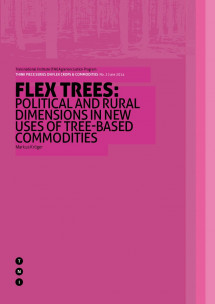Flex trees Flex trees: Political and rural dimensions in new uses of tree-based commodities
Flex trees seem to offer timely opportunities for socio-environmentally sustainable solutions, but also present dangers, particularly if such changes accelerate the concentration of land and plantation-based development, whereby forests compete with and may replace food production.

Authors
With the rise of green and bio economies and the decrease in non-biomass-based resources, forests and trees are now seen as major sources to replace fossil fuels.
What political dimensions are involved in this transformation, which is simultaneously ongoing, anticipated and imagined? How will the transition affect rural realities and well-being? What issues should be considered in thinking about the possible directions that the more flexible use of trees might take? What are the potentials and pitfalls? What are the main drivers of change in developing new, flexible and multiple uses of trees and forests?
This paper explores the unknowns in the form of posing questions to which it seeks answers. The flexible and multiple uses of trees seem to offer timely opportunities for socio-environmentally sustainable solutions, but also present dangers, particularly if such changes accelerate the concentration of land and plantation-based development, whereby forests compete with and may replace food production.